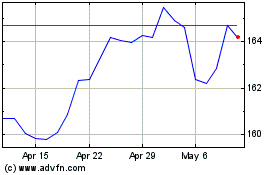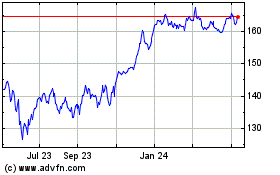T-Mobile Vows to Fight FCC Fines for Location Sharing -- Update
February 28 2020 - 6:12PM
Dow Jones News
By Drew FitzGerald
Federal Communications Commission enforcers told the country's
top cellphone carriers to pay more than $200 million in penalties
for allegedly mishandling sensitive location data, a punishment at
least one of the companies has already vowed to contest.
The telecom regulator is seeking more than $91 million from
T-Mobile US Inc., $57 million from AT&T Inc., $48 million from
Verizon Communications Inc. and $12 million from Sprint Corp.
T-Mobile said in a statement that it ended its location-sharing
program in February 2019 and would fight the proposed fine.
"While we strongly support the FCC's commitment to consumer
protection, we fully intend to dispute the conclusions of this NAL
and the associated fine," a T-Mobile spokeswoman said, referring to
the notices of apparent liability through which the five-member
commission disclosed the fines. Spokespeople for AT&T, Verizon
and Sprint said they were still reviewing the notices.
The FCC said the proposed penalty amounts reflected the length
of time each carrier had shared information without proper
safeguards and the number of entities that had access to the data.
The Wall Street Journal reported Thursday that the FCC was seeking
the fines.
The carriers can challenge the penalties proposed under the
FCC's decision, which would also charge the companies for each
future time they share cellphone coordinates without user
permission.
"The FCC has long had clear rules on the books requiring all
phone companies to protect their customers' personal information,"
FCC Chairman Ajit Pai said in a statement Friday. And since 2007,
these companies have been on notice that they must take reasonable
precautions to safeguard this data and that the FCC will take
strong enforcement action if they don't."
Cellular location data is different from other location
information that companies glean from smartphone apps and other
sources. Users can often turn off settings that reveal their
whereabouts to marketers, but phone companies need to know a
phone's rough location to provide wireless service.
Privacy advocates and some government officials said the
regulator's action didn't go far enough. Democratic Commissioner
Geoffrey Starks said the FCC's investigation took too long and
should have calculated the number of consumers actually affected by
the alleged lapses.
"The FCC's investigation is a day late and a dollar short,"
fellow Democratic Commissioner Jessica Rosenworcel said in a
statement, adding that a 30-day grace period for potential future
violations amounted to a "get-out-of-jail-free" card.
Section 222 of the Communications Act requires phone companies
to protect their customers' sensitive personal information,
including location data. The enforcement action revealed Friday
accuses the carriers of failing to make reasonable efforts to
police third-party data handlers that had access to the
information.
Sen. Ron Wyden (D., Ore.) urged the commission to investigate
wireless service providers' stewardship of such sensitive
information in a 2018 letter that highlighted alleged misuse of the
data by Securus Technologies, a prison phone service provider. The
Securus service, which was marketed as a tool to ferret out
contraband cellphones in prisons and jails, allowed law enforcement
clients to spot devices -- including those belonging to people who
weren't incarcerated -- without a court order.
The FCC on Friday highlighted one case of a Missouri sheriff
whose verification documents provided to Securus included copies of
his personal health and auto-insurance policies. The commission
said in a statement that carriers and those acting on their
behalves need to secure customers' express consent before
disclosing the data.
Securus said it discontinued the tool in May 2018.
Industry executives have said cellphone companies didn't
generate much revenue from their contracts with middlemen offering
location-based services. But some carriers struggled to quickly cut
off the companies before they could develop an alternative system
for services that subscribers might welcome, like highway towing
companies.
T-Mobile Chief Executive John Legere said in early 2019 that the
wireless company was "completely ending location aggregator work"
within months. "We're doing it the right way to avoid impacting
consumers who use these types of services for things like emergency
assistance," he wrote on Twitter at the time.
T-Mobile agreed to merge with Sprint in an all-stock combination
that was worth $26 billion when it was announced in early 2018. The
two carriers won a federal court ruling earlier this month that
paves the way for a transaction that would reshape the wireless
industry. Executives have said they hope to close the merger on
April 1.
--Sarah Krouse contributed to this article.
Write to Drew FitzGerald at andrew.fitzgerald@wsj.com
(END) Dow Jones Newswires
February 28, 2020 17:57 ET (22:57 GMT)
Copyright (c) 2020 Dow Jones & Company, Inc.
T Mobile US (NASDAQ:TMUS)
Historical Stock Chart
From Aug 2024 to Sep 2024

T Mobile US (NASDAQ:TMUS)
Historical Stock Chart
From Sep 2023 to Sep 2024
